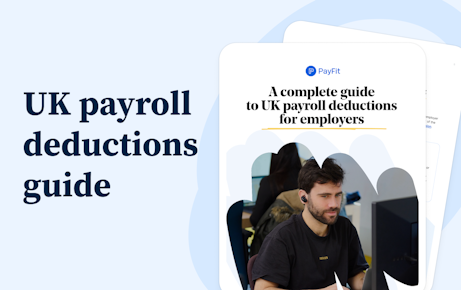A Guide to Employment Tax in the UK Including Employer Contributions


If you employ people in the United Kingdom, then you have an obligation to collect and pay UK employment tax to HMRC on any gross wages you pay to your employees.
You knew this already, of course. But we wanted to gather all the information we could on UK payroll tax, deductions, contributions and so forth, so you’ve got it in one handy place. It’s worth remembering that even company directors are considered employees and are therefore liable to any of the UK employment taxes mentioned in this article.
So have a read and remember to bookmark this page and come back to it anytime you need a refresher on UK employer payroll taxes!
What is employment tax in the UK?
When we refer to employer payroll taxes, we’re talking mainly about income tax (administered through the PAYE (Pay As You Earn) system as well as National Insurance contributions.
There is another employment tax relating to tax you’d pay on benefits; we’re talking company cars, private health insurance, travel or entertainment expenses. PAYE is the mechanism by which HMRC collects all employer taxes from businesses.
On top of these payroll taxes, employers will have to make other deductions from gross employee salaries, such as pension contributions, student loan repayments, and Child Maintenance Payments (where applicable). But more on that later.
How much do UK employer taxes cost?
How much you’ll pay in employer payroll taxes depends on a couple of things.
For one, there are different National Insurance categories. How much you pay in employer NICs will, therefore, depend on which category an employee falls under. Most employees will fall under category A, which does make things a bit simpler - the employer tax percentage for this category is 13.8%.
As for income tax, it's the employee's personal allowance and tax brackets that determine how much you need to pay.
The first £12,570 of an employee’s annual income will be tax-free. This is known as the personal allowance. From there, income falls into 20%, 40% and 45% income bands in England, Wales and Northern Ireland.
Which employment taxes and contributions are mandatory in the UK?
When it comes to UK employment tax, All employers must pay National Insurance Contributions (NICs), pay into a pension scheme, and, if needed, pay taxes on benefits-in-kind (BIKs). While income taxes don’t directly come from the employer, it’s your job to withhold and remit these taxes on behalf of the employee.
Let’s dig a little deeper into each of these types of payroll taxes and contributions…
National Insurance
A contribution paid by UK employers, employees and self-employed individuals, National Insurance (NI) is used to pay for state programs such as State Pension, Jobseeker’s Allowance, and bereavement support payments. In short, these programs provide income for individuals who are unemployed, have fallen ill, are retired or are on maternity or bereavement leave.
As we mentioned before, there are a few different ‘classes’ of National Insurance, or NIC category letters as they’re often called. Employee NIC rates will vary based on these. Class 1 NI is the most common type and is payable on any employee’s earnings over £242 per week, £1,048 per month, or £12,570 per year (2024/25 tax year). This is known as Primary Class 1 NI.
Additionally, employers must make a Secondary Class 1 NI contribution. Rather than being deducted from employee earnings, this is paid by the employer on behalf of employees. The income thresholds for Secondary Class NI are £175 per week, £758 per month or £9,100 per year (again, 2024/25 tax year), meaning you must pay this kind of payroll tax in the UK for all employees earning over those amounts.
Income Tax
Income tax is a UK employer tax that’s collected by HMRC through the PAYE system each time employees are paid. As an employer, it’s your responsibility to deduct tax and NICs from an employee’s pay and let HMRC know about any additional (taxable) benefits-in-kind the employee receives.
There are a few factors that determine how much income tax an employee will have deducted from their pay - their level of income, their amount of eligible personal allowance (dictated by their tax code) and the region in which they work: England, Wales, Northern Ireland or Scotland. Find out more about income UK tax brackets.
Most employees in the UK will receive a personal allowance of £12,570 (and there are very few exceptions). This means they won’t have to pay tax on the first £12,570 they earn in a tax period.
The first table shows tax bands for England, Wales, and Northern Ireland. The second illustrates the ones for Scotland.
| Type | Rate | Band |
|---|---|---|
| Personal Allowance | 0% | Up to £12,570 |
| Basic Rate | 20% | £12,571 - £50, 270 |
| Higher Rate | 40% | £50, 271 - £125, 140 |
| Additional Rate | 45% | Over £125,140 |
| Type | Rate | Band |
|---|---|---|
| Personal Allowance | 0% | Up to £12,570 |
| Starter Rate | 19% | £12,571 - £14,876 |
| Basic Rate | 20% | £14,877 - £26,561 |
| Intermediate Rate | 21% | £26,562 - £43,662 |
| Higher Rate | 42% | £43,663 - £75,000 |
| Advanced Rate | 45% | £75,001 - £125,140 |
| Top Rate | 48% | over £125,140 |
Workplace pension
When we hear the phrase ‘employer contributions’ in relation to employment tax in the UK, we tend to think of pensions.
All employers who hire staff must offer a pension scheme to employees within 3 months of their start date based on qualifying criteria. This is what’s known as auto enrolment. So if an employee:
is aged between 22 and 68 (current state pension age);
earns at least £10,000 a year / £192 a week / £833 a month;
works in the UK, either under a contract of employment or to provide work or services as part of another business…
…then they must be auto-enrolled into a workplace pension scheme.
Both parties must contribute. The employer’s minimum contribution is 3% of the employee’s gross qualifying earnings. Employees then have to contribute 5%, taking the total up to 8%. Employers can choose to pay more if they so wish, meaning that employees have to pay less from their own pockets (this could be a great recruitment and retention tactic).
Benefits-in-kind
Finally, we’ll talk about BIKs. Often regarded as ‘perks’, these benefit employees on a personal level without being directly tied to any business goals. Private medical insurance, company cars, and gym memberships are but a few examples.
BIKs are indeed taxable, Employers must contribute 13.8% of their monetary value as UK employment tax. Employees must also pay tax on BIKs via the PAYE system. In other words, employers must treat BIKs like cash bonuses as additional earnings and make appropriate deductions for this through PAYE.

UK employment tax FAQs
What about student loan deductions and UK payroll tax?
Employers in the UK are obliged to deduct student or postgraduate loan repayments from relevant employees’ gross pay packets and report these deductions to HMRC. The amounts owed are then transferred automatically through the PAYE system, and interest will then be applied to the balances of individual graduates. So, in terms of UK payroll and tax, there are no additional payments to be made to HMRC by employers over and above what is deducted from the individual’s gross salary.
What is small employer’s relief in relation to UK employment tax?
Small business owner or operator? Then depending on how much NICs you pay, you could be eligible for what’s called small employer’s relief.
If you class as a small employer, you will be able to reclaim 103% (in other words, the whole amount plus a further 3%) of the Statutory Payments made to employees, such as SMP, SPP, SAP, and ShPP. To qualify, your total NIC payments (both employer and employee) must have been £45,000 or less in the last tax year before the qualifying week for parental leave.
If you're not a small employer, then not to worry, you can still reclaim 92% of these payments. Simply deduct the appropriate percentage from your payments due to HMRC.
What about self-employed contractors? Do I need to pay employer payroll taxes for them?
If a worker is classed as self-employed, then they don’t rely on an employer. Therefore you don’t need to pay income tax or make any deductions on their behalf. You can find out more about how to determine someone’s employment status and what rights and protections each of the categories are afforded.
Make UK employment tax withholdings and deductions a cinch
With PayFit, you no longer have to worry about calculating and taking the right amount of employment tax...as we do it all for you!
Automated Compliance
Our platform includes automated compliance features that streamline your payroll processes. With automatic Real Time Information (RTI) submissions to HMRC, your data is always accurate and submitted on time, helping to keep those HMRC fines at bay. Additionally, automatic enrolment and pension submissions, alongside GDPR compliance, are seamlessly integrated into your workflow.
Precision in Automatic Calculations
When it comes to calculations for NICs, income tax and deductions, PayFit automates the entire process. We also handle all statutory leave calculations, promptly updating your employees’ digital payslips, ensuring accuracy and transparency across the board.
Expert Support
Beyond the software, our expert support team is ready to assist with any HR or payroll questions you might have. Our team consists of CIPP-qualified payroll professionals who offer guidance on everything from policy implementation to optimizing the use of our features. With PayFit, you have a knowledgeable partner in all things payroll and HR.
P11D Forms Explained: A Guide For UK Employers In 2025
How Much Does an Employee Cost UK Employers in 2025?

Bank Holidays UK: Employment Law Guide 2025
UK Statutory Notice Periods - An Explainer For Businesses
What Is OTE? How UK Businesses Can Unlock Its Potential






